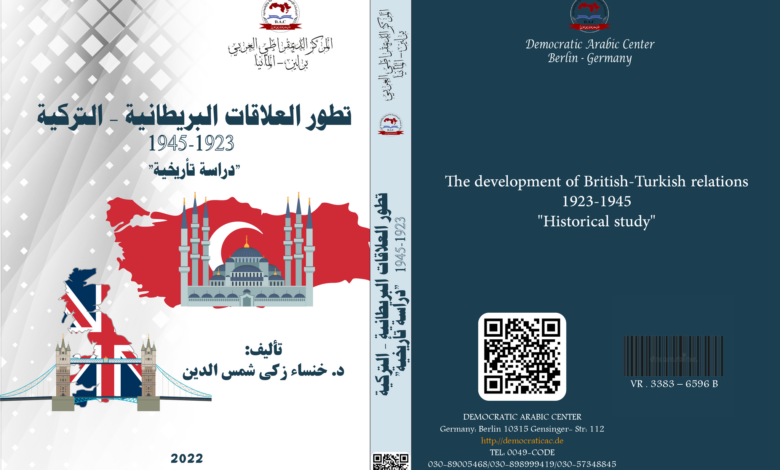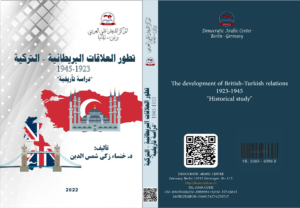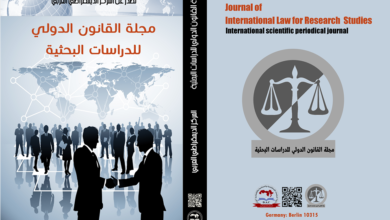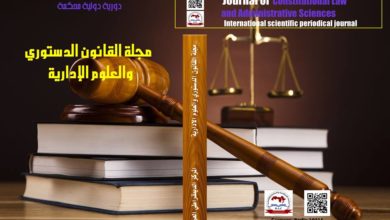تطور العلاقات البريطانية – التركية 1923-1945 ” دراسة تأريخية “
The development of British-Turkish relations 1923-1945 Historical study

تأليف : د. خنساء زكي شمس الدين – المُديرية العامة للأشراف التربوي/ وزارة التربية العراقية
نسخة “pdf”-
تطور العلاقات البريطانية – التركية 1923-1945 دراسة تأريخية
الطبعة الأولى “2022″ –من كتاب: – تطور العلاقات البريطانية – التركية 1923-1945 ” دراسة تأريخية “
جميع حقوق الطبع محفوظة #المركز_الديمقراطي_العربي ولا يسمح بإعادة إصدار هذا الكتاب أو اي جزء منه أو تخزينه في نطاق إستعادة المعلومات أو نقله بأي شكل من الأشكال، دون إذن مسبق خطي من الناشر .
تقديم:
اكتسبتْ دراسة العلاقات الدولية أهمية تاريخية وسياسية خاصة، لكونها تشكل معيناً مهماً من المعلومات للباحث المتخصص والمتابع لتطور وتأثير السياسة الخارجية لأية دولة على العلاقات الأقليمة والدولية، إذ أن دراسة تلك العلاقات وما يؤثر فيها ويتحكم بها من أمور وما يستخلص منها من نتائج، يُعد مؤشراً لقوة أو ضعف الروابط السياسية بين العديد من الدول، لاسيما وأن التنافس والصراع على المناطق الحيوية واقتسام مناطق النفوذ أصبح طابعاً مميزاً لعلاقات الدول الكبرى التي تحكمت في الشؤون الدولية خلال مراحل التاريخ المعاصر.
في ضوء ذلك، ثمة مبررات عدة، سياسية واستراتيجية واقتصادية وغيرها تدعو الى تقارب الدول فيما بينها، وإن المتتبع لتاريخ العلاقات البريطانية ـ التركية، وسرعة عودتها بعد قطيعة لم تتجاوز الا بضع سنوات، لا بد من ان يدرك اهمية المصالح المشتركة التي تربط الدولتين، واهمية الموقع الجغرافي – السياسي الذي تتمتع به تركيا بوصفها حلقة وصل بين اسيا وأوربا، وتطل على البحر الاسود والبحر الابيض المتوسط، وتمتلك ممرات مائية ـ مضيقي البوسفور والدردنيل ـ مهمة فيما يخص حركة مرور التجارة العالمية. وكذلك موقعها المجاور للمصالح البريطانية في العراق والخليج العربي، وبوصف تركيا مصدراً مهماً من مصادر المواد الخام التي تحتاجها الصناعات البريطانية وسوقاً رائجة لتلك الصناعات. فضلاً عن ان تركيا كانت بحاجة لبريطانيا، نظراً لما كانت تتمتع به الاخيرة في ذلك الوقت من قدرات عسكرية ومركز سياسي بوصفها دولة كبرى، وحاجة تركيا الى تلك القدرات للدفاع عن امنها وسيادتها في حالة تعرضها لأي عدوان خارجي. ومن هنا كان اختيارنا لدراسة (تطور العلاقات البريطانية – التركية 1923 – 1945)، إذ مثل التأريخ الاول اعلان الجمهورية التركية الحديثة في حين مثل التأريخ الثاني نهاية الحرب العالمية الثانية.
قُسمت الدراسة إلى تمهيد وفصلين وخاتمة، تناول التمهيد الجذور التأريخية للعلاقات البريطانية -العثمانية1856-1923، في حين جاء الفصل الأول تحت عنوان موقف بريطانيا من السياسة الخارجية التركية (1923-1936) ، إذ قسم إلى أربعة محاور، تطرق المحور الاول إلى العلاقات البريطانية – التركية 1923-1935، بينما درس المحور الثاني المضائق وأثرها على طبيعة العلاقات البريطانية- التركية، في حين ناقش المحور الثالث الموقف البريطاني والدولي من مسألة المضائق التركية عام 1936، بينما أوضحَ المحور الرابع الموقف البريطاني من ابرام اتفاقية مونترو (20 تموز 1936).
تتبع الفصل الثاني التطورات الدولية وأثرها على العلاقات البريطانية –التركية (1937-1945)، وجاء في اربعة محاور ايضاً، تناول الاول تطور العلاقات البريطانية -التركية (1937 – 1938)، بينما تطرق الثاني إلى جهود الخارجية البريطانية في توقيع بيان آيار 1939 مع تركيا، في حين درس المحور الثالث جهود ألمانيا والاتحاد السوفيتي في أبعاد تركيا عن الوفاق البريطاني – الفرنسي عشية الحرب العالمية الثانية، أمّا المحور الاخير فقد بينَّ أثر التطورات الدولية على طبيعة العلاقات البريطانية –التركية (1939-1945).
Abstract
The study of international relations has acquired a special historical and political importance, as it constitutes an important source of information for the specialized researcher and the follower of the development and impact of the foreign policy of any country on regional and international relations. Or the weakness of political ties between many countries, especially since competition and conflict over vital areas and the sharing of areas of influence have become a distinctive feature of the relations of major countries that have controlled international affairs during the stages of contemporary history.
In light of this, there are several justifications, political, strategic, economic, and others calling for countries to rapprochement with each other. Those who follow the history of British-Turkish relations, and the speed of their return after a rupture that did not exceed a few years, must realize the importance of the common interests that bind the two countries, and the importance The geopolitical position that Turkey enjoys as a link between Asia and Europe, overlooking the Black and Mediterranean Seas, and possessing waterways – the Bosphorus and Dardanelles straits – are important for global trade traffic. As well as its location adjacent to British interests in Iraq and the Arabian Gulf, as Turkey is an important source of raw materials needed by British industries and a popular market for those industries. In addition, Turkey needed Britain, given the latter’s military capabilities and political status at that time as a major country, and Turkey’s need for those capabilities to defend its security and sovereignty in the event of any external aggression. Hence our choice to study (the development of British-Turkish relations 1923 – 1945), as the first history represented the declaration of the modern Turkish Republic, while the second history represented the end of World War II.
The study was divided into an introduction, two chapters and a conclusion. The preface dealt with the historical roots of the British-Ottoman relations 1856-1923, while the first chapter came under the title Britain’s position on Turkish foreign policy (1923-1936), as it was divided into four axes. The first axis dealt with British relations – Turkish 1923-1935, while the second axis studied the straits and their impact on the nature of British-Turkish relations, while the third axis discussed the British and international position on the issue of the Turkish straits in 1936, while the fourth axis explained the British position on the conclusion of the Montreux Convention July 20, 1936.
The second chapter traces international developments and their impact on British-Turkish relations (1937-1945), and it came in four axes as well. The first dealt with the development of British-Turkish relations (1937-1938), while the second dealt with the efforts of the British Foreign Office in signing the May 1939 statement with Turkey. , while the third axis studied the efforts of Germany and the Soviet Union in keeping Turkey away from the British-French accord on the eve of World War II. As for the last axis, it showed the impact of international developments on the nature of British-Turkish relations (1939-1945).
- الناشر: المركز الديمقراطي العربي للدراسات الإستراتيجية والسياسية والاقتصادية





